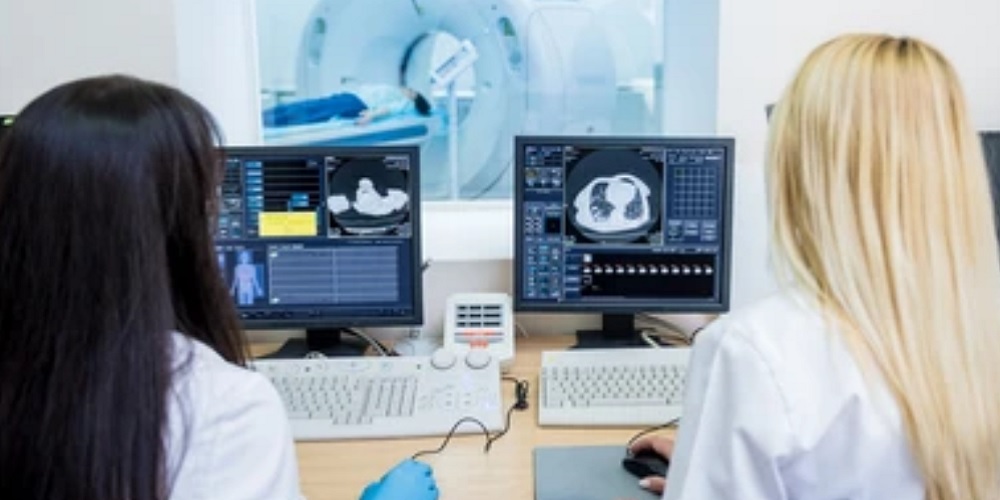6 Tips for Improving Efficiency in the Radiology Department

Radiologists, center managers, directors in radiology, and IT staff members are continually searching for ways of improving efficiency in the radiology department to increase productivity.
In recent decades, there has been an increased demand for imaging services. With the impact of the COVID-19 pandemic, the radiology department has become busier than ever, and it seems like it may not be getting better any time soon. The question, then, is this: how can more be done in the same amount of time?
In the wake of the pandemic, the pressure of the increased workload has caused radiology departments to not only welcome new innovative ways to improve operational efficiencies but also take advantage of existing technologies that are cost-saving and provide a better patient and physician experience.
With the right tools and imaging solutions in place, an improved, efficiently operating radiology department cuts down on lengthy wait times for patients, optimizing patient flow and ensuring a smooth workflow.
Here are a few tips for improving efficiency in the radiology department.
1. Radiology Informatics
The use of radiology informatics to improve efficiency in radiology begins with standardization, an essential element of quality improvement. Removing potential personalized or singularized work by automating routine information flow is one fundamental way of improving efficiency and reducing errors in the radiology department.
Alexander Towbin, MD, chair of radiology informatics and associate chief of clinical operations and informatics at Cincinnati Children's Hospital, says, "As radiologists, we're seeing anywhere from 50 to 100 to 200 patients daily, depending upon the practice. That's a huge number of patients. . . . And, to do so safely and be an effective radiologist, you must have efficient systems."
Having an order-naming protocol, renaming confusing orders, creating combination orders of tests usually performed together (e.g., chest, abdomen, and pelvis), and having an adjustable or open-ended result delivery system are a few structured ways to keep your radiology practice more efficient.
2. Integrated Image Capture
Another important tip for improving efficiency in the radiology department is by integrating image capture with other software systems, such as picture archiving and communication systems (PACS) and radiology information systems (RIS). This saves time, eliminates the need to log into multiple individual systems, and reduces possible errors when creating a procedure manually.
For practices with portables, easy access to RIS and PACS, which is fully integrated with image capture, makes the workflow of the radiographers smooth as they move from room to room. They can find patients' records on the portable without needing to make the trip back to the department.
Towbin also explains that a tool that would enable individual radiologists to sign into the RIS, PACS, and dictation systems at the same time and even launch preferred educational websites or teaching resources would be an excellent next technological step. "It would be nice to have that sort of automated log-in, but so far, we haven't seen an application like that."
3. Hybrid Storage Systems
Employing hybrid storage systems and factoring in different workflows adopted by different radiologists, NovaPACS’s additional features can help imaging center managers and radiologists unlock efficiencies and improve profitability at their centers.
With a feature-rich web-based viewer, NovaPACS makes it easier for imaging specialists to read, dictate, and create reports. It has the ability to provide millions of likely workflow combinations and sets of role-based features and preferences, making it an excellent imaging solution for any radiology practice.
4. Improved Information Flow
Enhancing information flow is another critical tip for improving efficiency in the radiology department.
With Nova RIS, imaging center managers and radiologists can work harmoniously and uninterruptedly with patients and optimize workflows to increase productivity.
Nova RIS has excellent features to minimize schedule disruptions, reduce human errors, eliminate unnecessary paperwork, integrate into your EMR, optimize workflow, and keep productivity and profitability high while also helping to provide an ideal experience for patients and referring physicians.
5. Maximized Tele-presence
Maximize telepresence and teleconsultation via image acquisition from a central location, thus saving time and enabling experts to provide assistance in real time to multiple locations instead of traveling from one place to another.
An imaging tool with the ability to share images and information with colleagues, irrespective of their location, to get second or third opinions for more accurate diagnoses and treatment plans makes imaging operations more efficient.
Novarad Enterprise Imaging enables physicians to assess changes over time, collaborate with colleagues, and engage patients. Leveraging Novarad's secure mobile computing products’ web-based and mobile-viewing capabilities, image sharing, text alerts, eforms and more, all while ensuring the security of the data, enables healthcare providers to be highly productive regardless of their location.
6. Enhanced communication
Create a positive patient experience by intensifying your commitment to communication and optimizing patient flow. Try to prevent long wait times, but where it is impossible, be proactive in communicating with patients and making them comfortable.
Patients tend to become increasingly frustrated and anxious when there is a lack of communication. When they are provided with periodic updated information, that can help curb anxiety about wait times.
With efficient scheduling, there can be a reduction in patient wait times, and enhanced communication lets them know the time that they are supposed to be in the hospitals or clinics for their examinations. This decreases wait times and prevents frustrations. Nova RIS has excellent scheduling features and patient reminders to keep patients informed about their procedures.
Conclusion
Applying optimal techniques and using the right tools and imaging solutions in your practice are great ways to improve efficiency in the hospitals or your technique and improve your bottom line.
Here at Novarad, we believe that the key to a successful imaging center is to work smarter, not harder, to deliver the type of care and outcomes that patients desire.
To see how we can help improve your workflows, feel free to reach out to our workflow specialists today!
%20(3).png?width=1555&height=462&name=Novarad%20EHS%20Logo%20Full%20Color%20(1)%20(3).png)
